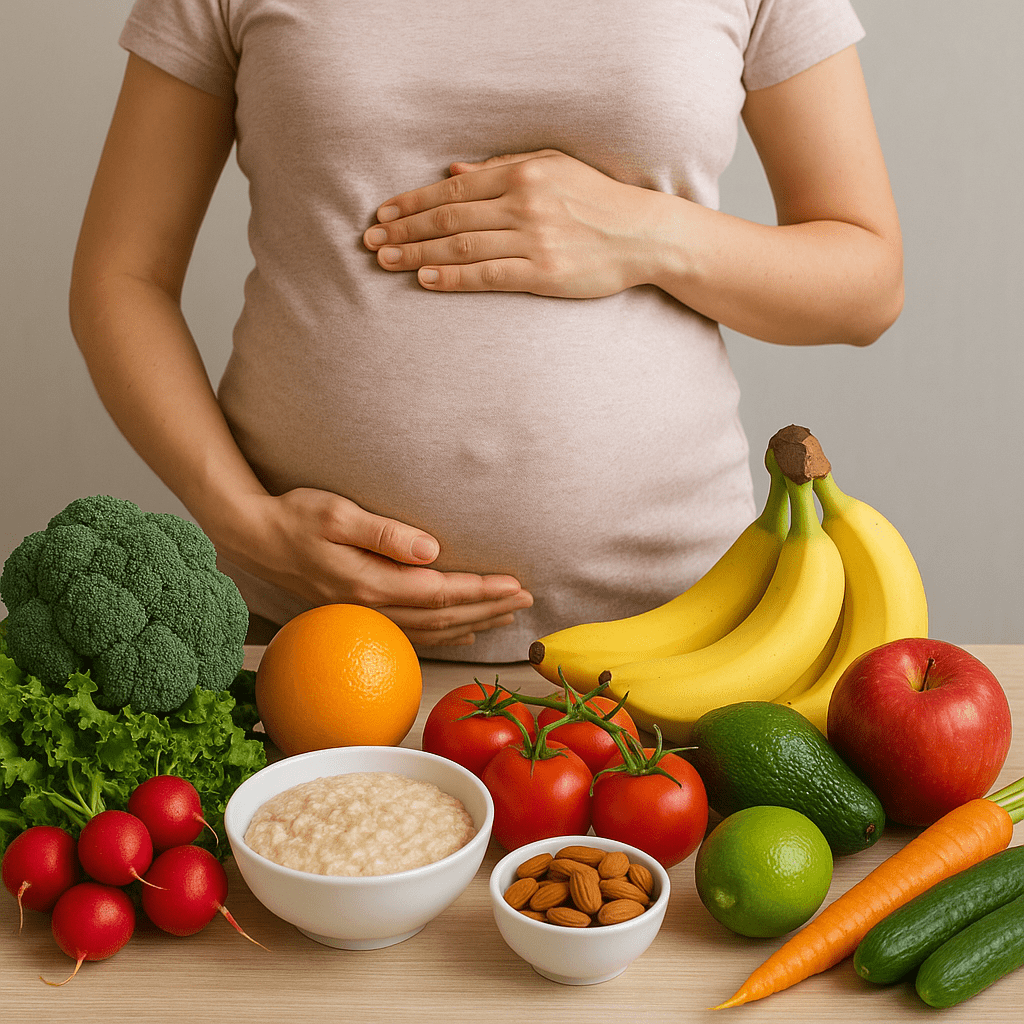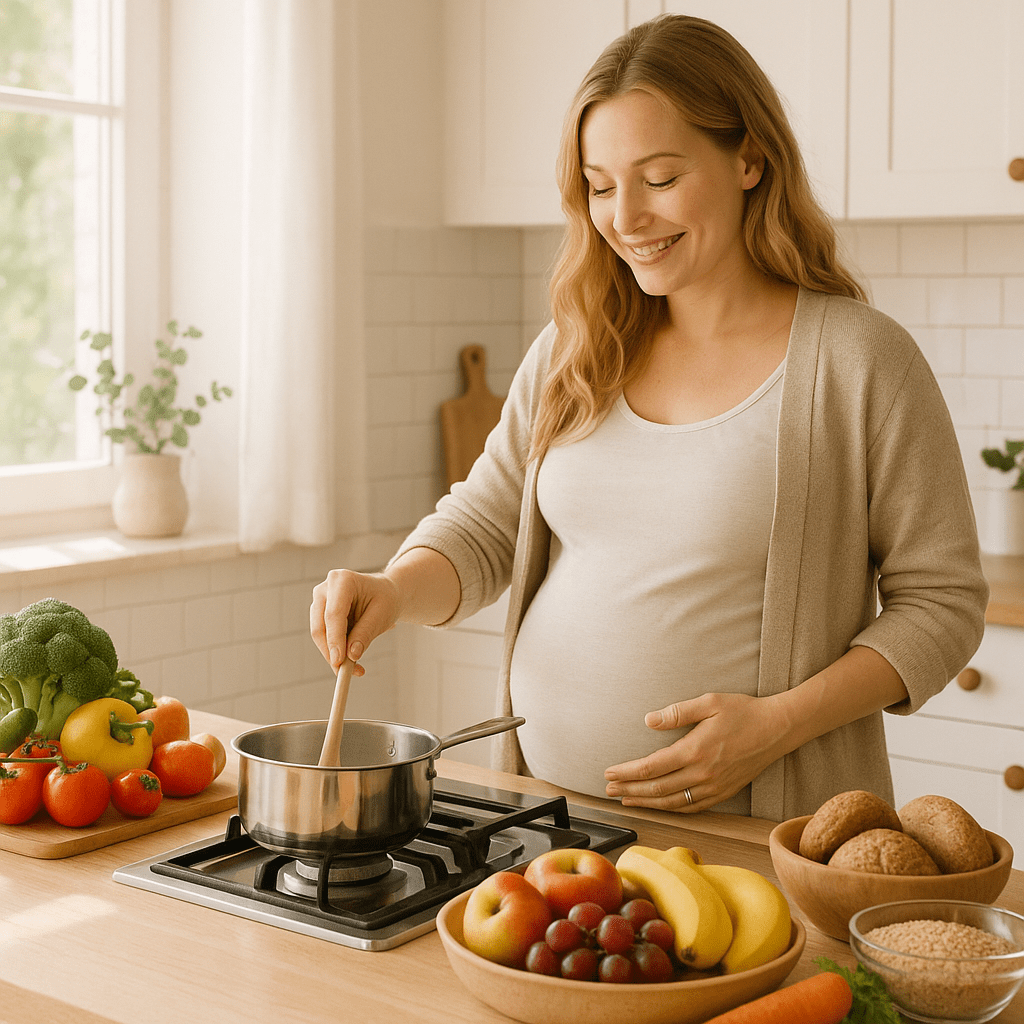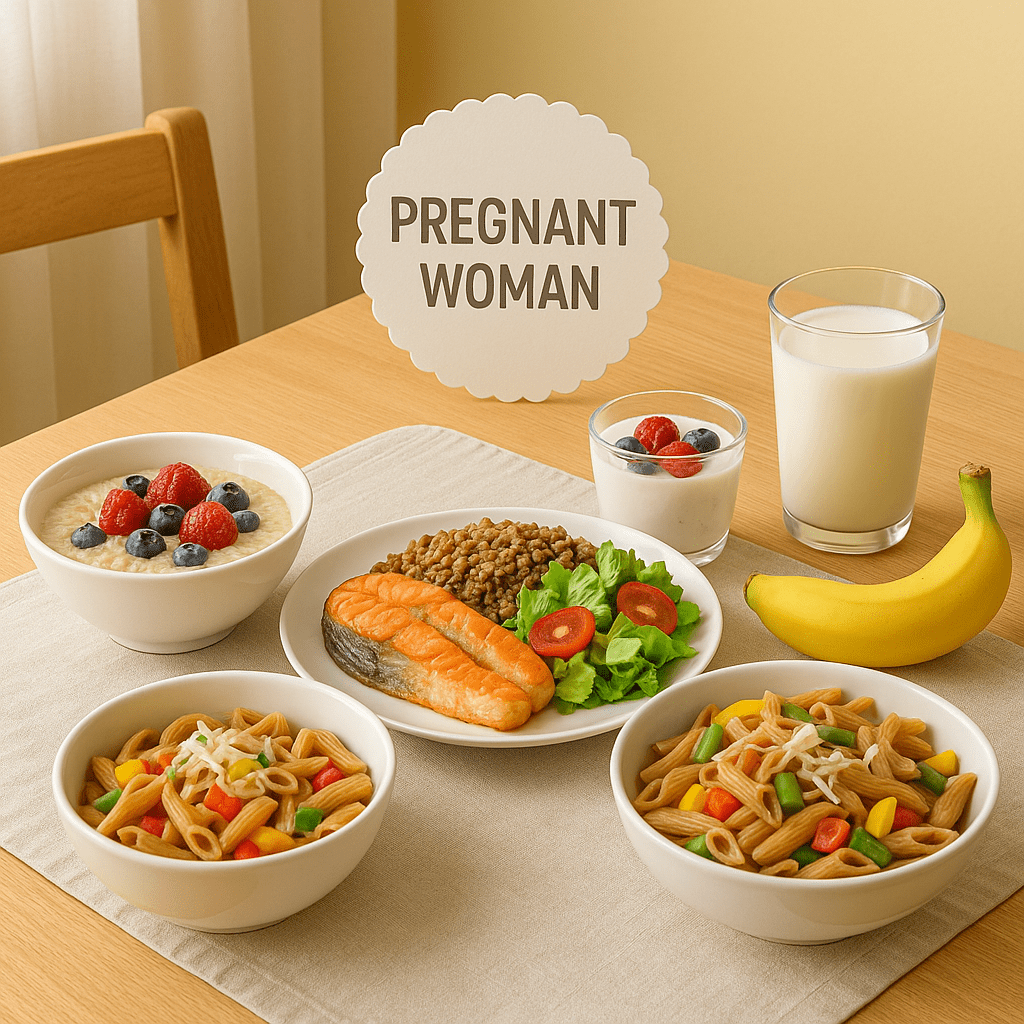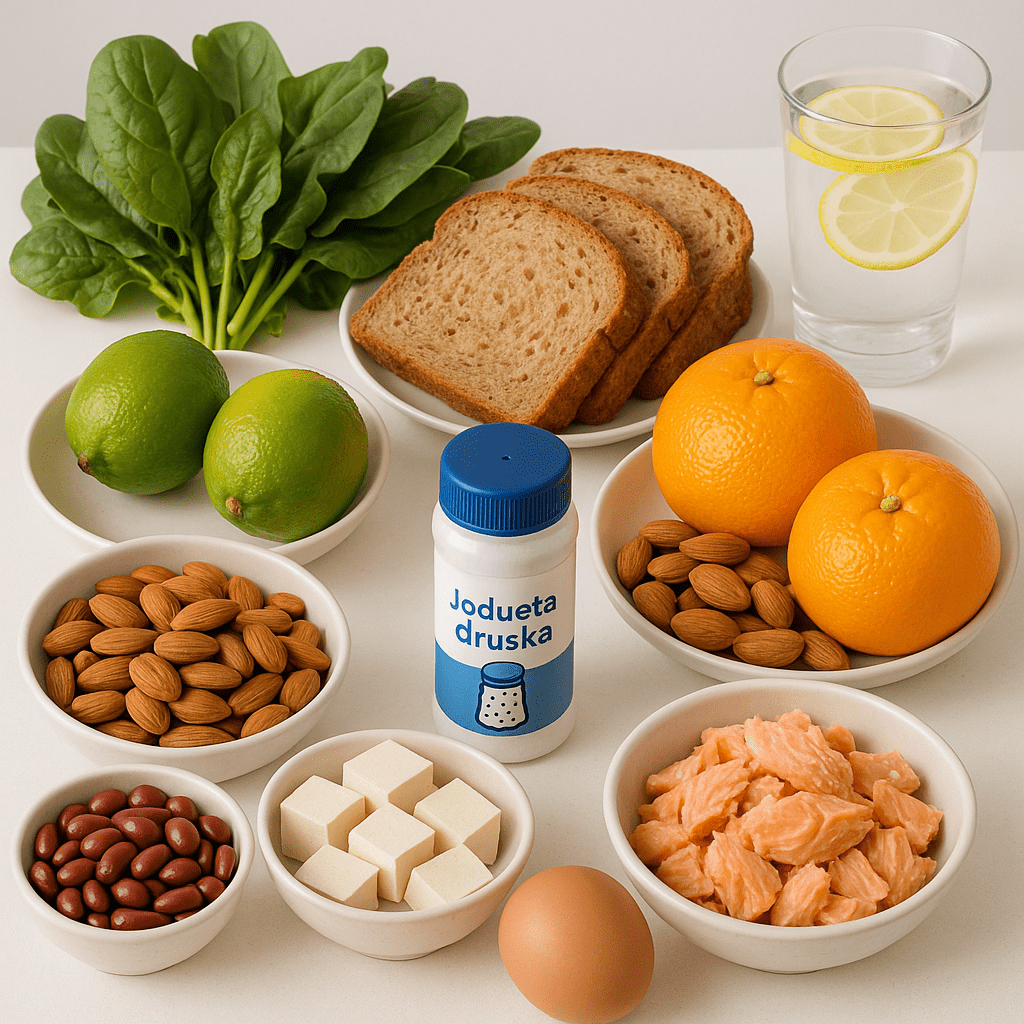Expecting a baby is one of the most beautiful, but also the most responsible periods in a woman’s life. At this time, it is extremely important to consider your eating habits, as they directly affect not only your health, but also the health of your baby. Proper nutrition during pregnancy helps ensure normal fetal development, reduces the risk of complications and provides the expectant mother with the necessary nutrients.
In addition, a healthy intestinal microflora helps maintain a strong immune system – good bacteria (probiotics) can help with this.
In this article, we will discuss the most important nutritional principles for pregnant women – from energy needs and a balanced diet to foods to avoid and the importance of vitamins and minerals. We will also share practical tips on how to overcome the most common nutritional challenges during pregnancy.
Energy and calorie needs during pregnancy
Many women face the myth of “eating for two” at the beginning of pregnancy. In fact, the additional calorie requirement is not as great as is often imagined.
In the first trimester of pregnancy, additional calories are usually not needed – your usual food intake is sufficient. In the second trimester, it is recommended to consume an additional 340 calories per day, and in the third – about 450 calories. It is important to note that these figures are approximate and depend on individual factors: a woman’s height, weight before pregnancy, physical activity and general health.
The optimal weight gain during pregnancy for women with a normal BMI (18.5-24.9) should be around 11.5-16 kg. If the BMI is lower or higher than normal, weight gain should be adjusted accordingly according to the doctor’s recommendations.
Weight control during pregnancy is important, but it should not be stressful. A more beneficial approach is to focus not on counting calories, but on eating quality foods that will provide the body with the necessary nutrients.
Sample Daily Menu
Here is an example of a balanced daily diet that will provide your body with the necessary nutrients:
- Breakfast: Oatmeal with nuts, berries and flaxseed (330 kcal)
- Lunch snack: Apple and handful of almonds (170 kcal)
Lunch: Baked salmon with buckwheat porridge and vegetable salad (450 kcal) - Afternoon snack: Natural yoghurt with fresh berries (150 kcal). If you have difficulty swallowing supplements in pill form, you can choose Mims Beauty strawberry-flavored gummies with collagen and biotin.
- Dinner: Whole wheat pasta with vegetables, baked cottage cheese and pesto sauce (400 kcal)
- Evening snack (if necessary): Kefir or milk with banana (200 kcal)
Total daily calorie intake: about 1700-1900 kcal (normal calorie requirement) + 340-450 kcal (additional in the second and third trimesters) = 2040-2350 kcal.
Balanced diet – what to choose every day?
A high-quality diet for pregnant women means a complete, balanced diet that provides your body with all the necessary substances.
When choosing food products, it is important to focus on the following basic nutritional elements:
- Grain products: whole grain bread, pasta, rice, buckwheat, oats. These products provide energy, fiber and B vitamins.
- Protein: lean meat, fish, eggs, legumes, nuts and seeds. Protein is essential for the formation of fetal tissues.
- Dairy products: milk, yogurt, cottage cheese, cheese – excellent sources of calcium, essential for the formation of bones and teeth.
- Vegetables and fruits: it is recommended to eat at least 5 servings of vegetables and fruits of various colors every day. They provide the body with vitamins, minerals and fiber.
- Healthy fats: olive oil, avocados, nuts, fish – omega-3 fatty acids are especially important for the development of the fetus’s brain and vision.
It is recommended to eat more often, but in smaller portions – 3 main meals and 2-3 snacks will help maintain stable blood sugar levels and avoid nausea, especially in the first trimester. Nutritionists advise pregnant women to eat every 3-4 hours.
It is important to choose a variety of foods – vegetables and fruits of different colors will provide a wide range of antioxidants and other beneficial substances. A variety of snacks during pregnancy can be a great way to supplement your diet with essential substances.
Special features for vegetarians and vegans during pregnancy
Women who follow a plant-based diet should pay special attention to the adequacy of certain substances:
- Protein: additionally consume legumes, soy products, nuts, seeds.
- Iron: choose sources of iron – beans, lentils, tofu, spinach, seeds, fortified grain products.
- Vitamin B12: essential for CNS development, found only in animal foods, therefore supplements or fortified products are recommended.
- Calcium: consume calcium-fortified plant-based milk, tofu with calcium, dark green leafy vegetables.
- Omega-3 fatty acids: flaxseed, chia seeds, walnuts.
It is especially recommended for pregnant vegetarians and vegans to consult a dietitian or doctor about their individual needs. Sometimes additional gummies with vitamins can be useful, which will help ensure a sufficient amount of essential substances.
Foods and drinks to avoid during pregnancy
During pregnancy, it is especially important to control what products you consume, as some of them may pose a risk to the health of the unborn baby.
- Raw or undercooked meat and fish: can cause listeriosis, toxoplasmosis or salmonella infections.
Fish with high mercury content: shark, swordfish, mackerel, tuna (especially albacore) – high levels of mercury can damage the nervous system of the fetus. - Unpasteurized dairy products: can be contaminated with listeria bacteria.
Raw eggs: poses a risk of salmonella infection. - Alcohol: any amount of alcohol can harm the fetus and cause fetal alcohol syndrome.
- Excessive caffeine: it is recommended to limit to 200 mg per day (about 1 cup of coffee).
- Processed meats: sausages, hot dogs, ham – due to high levels of salt, nitrites and preservatives.
- Products with trans fats: fast food, some baked goods, margarines.
- Green sprouts: often grown in a humid environment that encourages the growth of bacteria.
- Untested homemade fermented products: may pose a risk of dangerous bacteria.
A safe alternative to fish is to consume small fish (sardines, anchovies), salmon or trout, which have lower mercury concentrations. It is recommended to eat 2-3 servings (140g each) of such fish per week.
Safety for pregnant women starts with informed choices – knowing dangerous products and their potential harm to the fetus can avoid many risks.
Principles of hygiene and safe nutrition
It is important not only what you eat, but also how you prepare food:
- Wash your hands thoroughly before and after preparing food.
- Separate raw meat and seafood from other products.
- Properly heat-treat food – meat, fish and eggs should be completely cooked.
- Wash fruits and vegetables, even if you are going to peel them.
- Store perishable products in the refrigerator.
- Avoid food that has been stored at room temperature for a long time.
Remember that the immune system is slightly weakened during pregnancy, so hygiene requirements are especially important. Vitamin gummies are food supplements that usually contain various vitamins.
Vitamins and trace elements: supplements and natural sources
During pregnancy, the body’s need for vitamins and minerals increases, so it is important to ensure their adequacy.
The most important vitamins and minerals for pregnant women:
- Folic acid (vitamin B9): essential for the prevention of neural tube defects. It is recommended to consume 400-800 μg per day, starting from the moment you plan to become pregnant. Natural sources: green leafy vegetables, citrus fruits, legumes, whole grains.
- Iron: helps prevent anemia and ensures oxygen transport. Natural sources: red meat, spinach, beans, fortified cereal products.
Vitamin D: important for calcium absorption and fetal bone development. Natural sources: sunlight, fatty fish, egg yolks, fortified dairy products. - Calcium: essential for the formation of fetal bones and teeth. Natural sources: dairy products, green leafy vegetables, almonds.
- Iodine: needed for the production of thyroid hormones and the development of the fetal nervous system. Natural sources: iodized salt, seafood, eggs.
- Omega-3 fatty acids: important for the development of the fetal brain and eyes. Sources: fatty fish, flaxseed, walnuts.
- Vitamin B12: especially important for vegetarians and vegans; participates in the formation of the nervous system. Sources: meat, fish, eggs, dairy products.
Many pregnant women are recommended to take special vitamin supplements, but it is important to choose them only after consulting a doctor. An overdose of some vitamins (especially A, D, E) can be harmful.
If you are taking antibiotics or experiencing digestive disorders, probiotics can help maintain intestinal and immune health. This is especially important during pregnancy, when the immune system is naturally weakened.
Fluid and Beverage Needs During Pregnancy
Sufficient fluid intake during pregnancy is extremely important for both your well-being and that of your baby.
It is recommended that pregnant women drink about 2-2.5 liters of fluids per day.
Most of your fluid intake should be water, but soups, unsweetened teas, milk, and fruit juices can also be included in your total.
Getting enough fluids can help:
- Prevent constipation, a common problem during pregnancy
- Reduce the risk of urinary tract infections
- Relieve the risk of swelling
- Reduce the risk of preterm labor
When it comes to coffee and other caffeinated beverages, it’s important to limit your caffeine intake to 200 mg per day (about 1 cup of coffee). Too much caffeine may be linked to an increased risk of miscarriage and lower birth weight.
Practical tips for fluid intake:
- Always carry a water bottle with you
- Drink a glass of water with every meal
- Add fresh fruit or berries (lemons, strawberries) to make it tastier
- Monitor the color of your urine – it should be light yellow
You can arrange your fluid intake as follows: drink a glass of water with breakfast in the morning, consume about 1.5 liters during the day, and the remaining amount in the evening, but not too late so as not to disturb your sleep due to frequent urination.
Common Pregnancy Nutrition Myths and Practical Tips
There are many myths and misleading information surrounding pregnancy nutrition. Here are some of the most common myths, based on facts:
- Myth: You need to eat for two during pregnancy.
- Reality: You don’t need twice as much food, but better quality food with an additional 340-450 calories (in the second and third trimesters).
- Myth: You should avoid fish during pregnancy.
- Reality: You should only avoid fish that are high in mercury, while other fish (salmon, trout, sardines) are very beneficial due to their omega-3 fatty acids.
- Myth: You should completely avoid caffeine during pregnancy.
- Reality: You can consume it in limited amounts – up to 200 mg per day.
- Myth: You should avoid spicy foods during pregnancy.
- Reality: If you don’t feel any discomfort, you can eat spices – they don’t harm the fetus.
Practical tips for overcoming common pregnancy problems:
Nausea: eat small portions every 2-3 hours, eat a biscuit or a piece of bread in the morning before getting up, avoid strong smells, drink ginger drinks.
- Heartburn: avoid large portions, fatty and spicy foods, do not eat before bedtime, sleep in a semi-sitting position.
- Constipation: drink more fluids, fiber, move.
- Unusual cravings: if you feel a craving for inedible substances (chalk, ice, earth), be sure to consult a doctor – this may be a sign of iron or other mineral deficiency.
Remember that each pregnancy is individual, so it is best to discuss any questions you have with your obstetrician-gynecologist or dietitian. They can provide advice tailored specifically to your situation.
Pregnancy is a great time to review your eating habits and start developing healthier ones. The best part is that these habits will benefit not only you, but your growing baby now and in the future.
Frequently Asked Questions
How many extra calories do I really need during pregnancy?
You usually need about 100-300 extra calories per day during the second and third trimesters, depending on your physical activity level and pre-pregnancy weight.
What foods should I avoid completely during pregnancy?
Avoid raw or undercooked meat, raw fish and sushi, unpasteurized dairy products, fish high in mercury, raw eggs, and alcohol.
Do I need to take prenatal vitamins if I eat a healthy diet?
Most pregnant women should take at least folic acid and vitamin D supplements. Depending on your diet and blood tests, you may also need iron and omega-3 supplements. Discuss your needs with your doctor.
Is it safe to drink coffee or tea during pregnancy?
Limit caffeine to no more than 200 mg per day (about one cup of coffee). Herbal teas should be used with caution; consult a healthcare professional for safe choices.
How much weight is normal to gain during pregnancy?
Most women are advised to gain 10-15 kg, depending on their initial BMI, but individual recommendations may vary.





